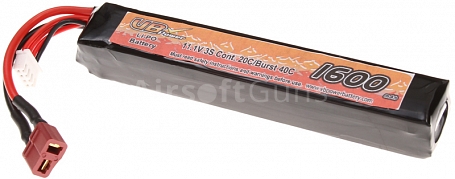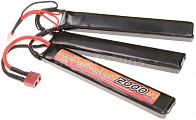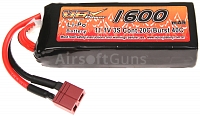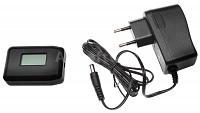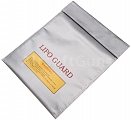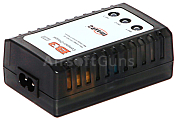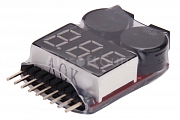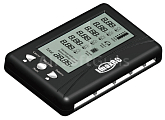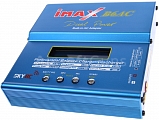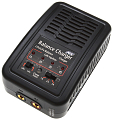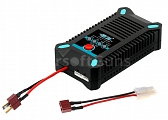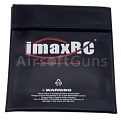Battery, stick, Li-Pol, 11.1V, 1600mAh, 20C, VB Power
Li-Pol battery 11.1V/1600mAh (20C) from VB Power. Top batteries directly from the manufacturer at the lowest possible prices. Battery connector is T-Dean. The maximum long-term discharge current 32A (peak up to 64A). Dimensions (mm): 127x21x20. Lithium Polymer (Li-Pol) batteries are the latest energy source. They excel in low weight and excellent discharge characteristics. Do not suffer from any memory effect and the advantage of very low self-discharge article about 1% per month, compared to 10-15% for NiCd, NiMH.By purchasing this product you earned 23 Reward Points.
More Information
Battery, stick, Li-Pol, 11.1V, 1600mAh, 20C, VB Power
Li-Pol battery 11.1V/1600mAh (20C) from VB Power. Top batteries directly from the manufacturer at the lowest possible prices. Battery connector is T-Dean. The maximum long-term discharge current 32A (peak up to 64A). Dimensions (mm): 127x21x20.
Lithium Polymer (Li-Pol) batteries are the latest energy source. They excel in low weight and excellent discharge characteristics. Do not suffer from any memory effect and the advantage of very low self-discharge article about 1% per month, compared to 10-15% for NiCd, NiMH. Due to an entirely different type of electrochemical reactions that take place inside the cells require completely different made than conventional NiCd or NiMH batteries.
Voltage Li-Pol cell is 3.7V (1.2V Unlike NiCd and NiMH batteries). In operation shall in no case exceed the cell voltage of 4.2V during reloading and fall below 3V. Exceeding these values indicates a high forbability of irreversible damage to the battery. In normal operation, the voltage (before charging begins) should not fall below 3.5V. If you find you start to charge a lower voltage, battery definitely discharge excessively.
For this reason, it is necessary to use a special charger for charging Li-Pol batteries, as well as use special protective circuit (Alarm Li-Pol), which notifies you of critical battery discharge.
Protect cells from mechanical damage - the removal of electrodes puncture. Doing so can cause internal short circuit, explosion and fire. Do not puncture "inflated" cells - inflation is a sign of internal damage and the article could be after a puncture turn into a flamethrower. During charging the battery place on a fireproof pad, or place to the Li-Pol Safe Bag. The vicinity must be free without fla mmable objects or liquids. Manufacturer recommends storing batteries charged at 70% of capacity.
Recommended airsoft accessories, parameters, review and other useful information about the product Battery, stick, Li-Pol, 11.1V, 1600mAh, 20C, VB Power can be found in the bookmarks.
Li-Pol battery 11.1V/1600mAh (20C) from VB Power. Top batteries directly from the manufacturer at the lowest possible prices. Battery connector is T-Dean. The maximum long-term discharge current 32A (peak up to 64A). Dimensions (mm): 127x21x20.
Lithium Polymer (Li-Pol) batteries are the latest energy source. They excel in low weight and excellent discharge characteristics. Do not suffer from any memory effect and the advantage of very low self-discharge article about 1% per month, compared to 10-15% for NiCd, NiMH. Due to an entirely different type of electrochemical reactions that take place inside the cells require completely different made than conventional NiCd or NiMH batteries.
Voltage Li-Pol cell is 3.7V (1.2V Unlike NiCd and NiMH batteries). In operation shall in no case exceed the cell voltage of 4.2V during reloading and fall below 3V. Exceeding these values indicates a high forbability of irreversible damage to the battery. In normal operation, the voltage (before charging begins) should not fall below 3.5V. If you find you start to charge a lower voltage, battery definitely discharge excessively.
For this reason, it is necessary to use a special charger for charging Li-Pol batteries, as well as use special protective circuit (Alarm Li-Pol), which notifies you of critical battery discharge.
Protect cells from mechanical damage - the removal of electrodes puncture. Doing so can cause internal short circuit, explosion and fire. Do not puncture "inflated" cells - inflation is a sign of internal damage and the article could be after a puncture turn into a flamethrower. During charging the battery place on a fireproof pad, or place to the Li-Pol Safe Bag. The vicinity must be free without fla mmable objects or liquids. Manufacturer recommends storing batteries charged at 70% of capacity.
Recommended airsoft accessories, parameters, review and other useful information about the product Battery, stick, Li-Pol, 11.1V, 1600mAh, 20C, VB Power can be found in the bookmarks.
 AirsoftGuns s.r.o.
AirsoftGuns s.r.o.
